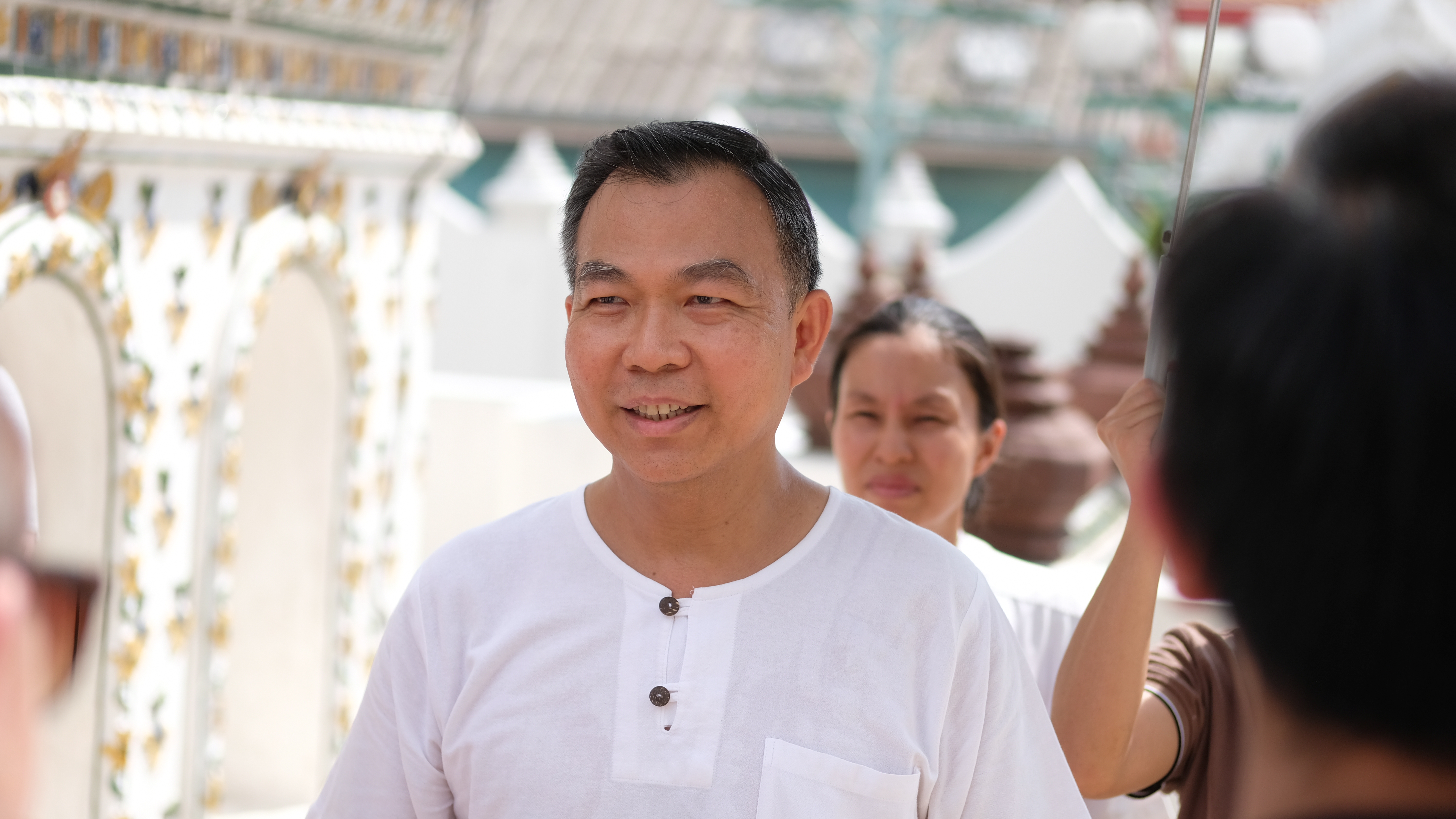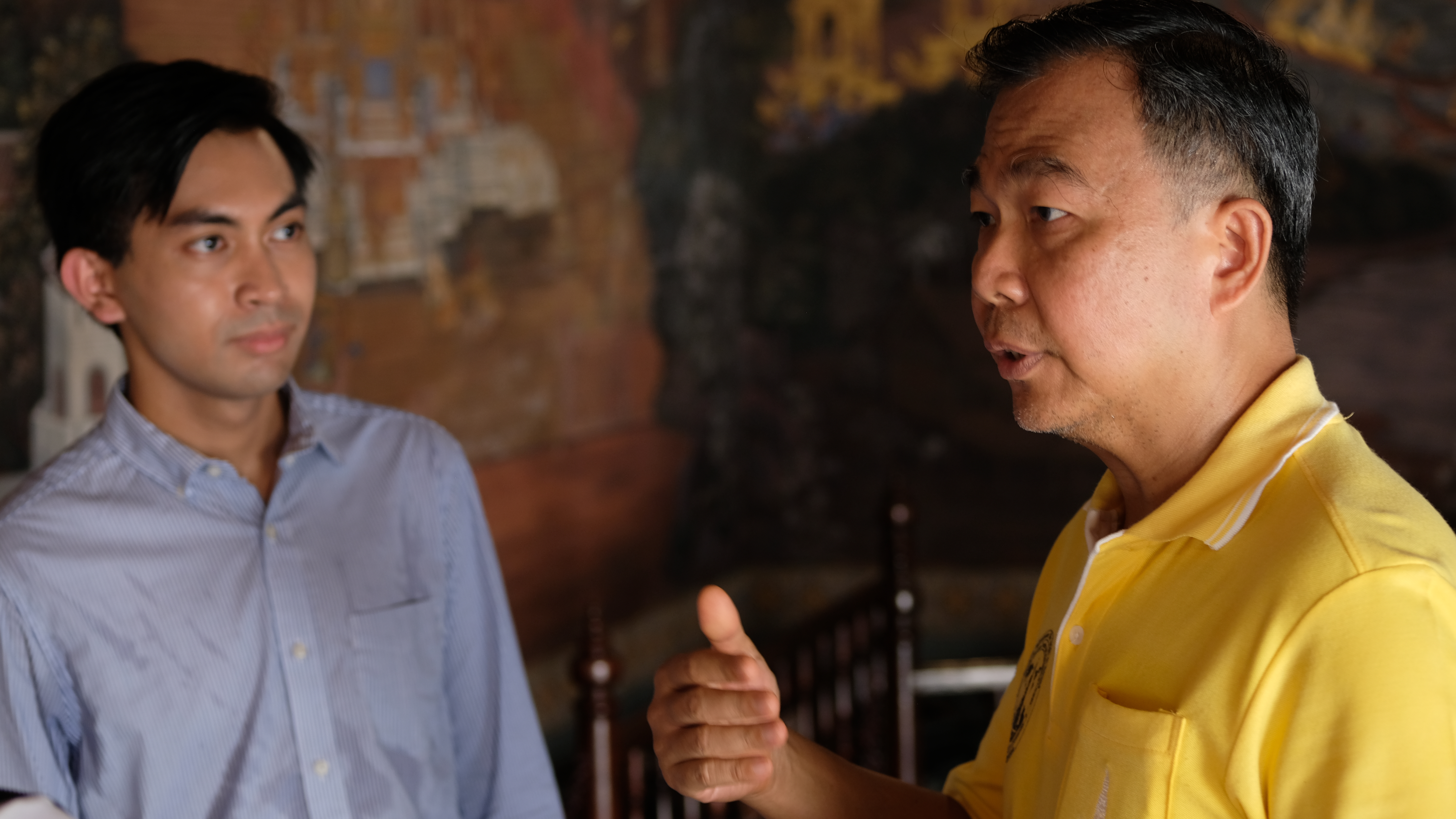Hartanto Gunawan’s Learning Center: The Role of Discipline and Education in Combating Human Trafficking
On the second day in Bangkok, we took a tour boat, which crossed the Chao Phraya River. As the boat started to move across the river, I was overwhelmed by the magnificent view that surrounds the river. At one end stands proudly the Ferris wheel that overlooks the city in Asiatique. On either sides of the river one can see the mingling of temples, outdoor markets, malls, high-rises, and houses of Bangkok civilians. It was obvious that one can spend weeks in Bangkok and would still have many places to visit. Our destination of the day, however, was Wat Arun, the Temple of Dawn.
As we step foot on the port, a women humbly dressed in white shirt and black skirt smiled brightly as she approached our direction. She *waied at Dr. Datta and introduced herself as the assistant of Mr. Hartanto Gunawan. Mr. Hartanto had lived in Thailand for over 21 years. Originally a successful businessman from Indonesia, he became a monk for two years to fulfill his mother’s wish and continued his monkship for 4 years. Quitting business altogether, Mr. Hartanto started his life anew and expanded his social circles in Thailand.
Wat Arun was developed by King Rama II in the early nineteenth century and finished by King Rama V. While at Wat Arun, we took a moment to reach the explore the gold and white temple and its history, the focus of the day was to learn about Mr. Hartanto’s Community Learning Center (CLC) and how he used what he had learned through Buddhism in order to help combat human trafficking in Thailand. Every year, he and his team go to the rural parts of the country, where road conditions are poor, which makes it hard for transportation to travel through. His mission is a challenging one: finding girls who are in danger of being recruited into human trafficking.
Mr. Hartanto brings in girls from age 17 and up to his learning center and provides them with opportunity to pursue higher education. Mr. Hartanto believes that by giving them the opportunity to properly compete with their peers in Bangkok and teaching discipline through the Buddhist teachings, they will have the chance to live a better life. The CLC teaches courses that help the girls prepare for nursing school. Mr. Hartanto says that being a nurse is a respectable job, which will also allow the girls to be in a position of power, something they were deprived of back in their home.
Mr. Hartanto depicts himself as someone who is very approachable and calm. His living accommodation is humble and his style consists of a plain white t-shirt, long black pants, and a pair of sandals. I was impressed that someone who has been invited by ASEAN, acknowledged by UNESCO, and respected by political leaders of the world could remain so humble. He fasts and only eats once a day, long ago leaving behind his lavish business life. His one focus now is combating trafficking by reaching out the girls who are prone to be victims and giving them opportunities to gain a better life.
Why the girls? First, after completing the primary education, girls around the age of 17 that live in the countryside is the group most prone to become recruits of human trafficking. Some of their parents may work with the traffickers while others have families in need of more income. Mr. Hartanto relies on building strong relationships with the villages and using the credibility his CLC has gained to convince more girls to join him in Bangkok.
The girls in the learning center have to wake up every morning at 4 AM in order to meditate with him before beginning their class at 7 AM. At 7 PM, they have to meditate again. The meditation taught at the CLC is not like the practice of mindfulness we often see in the States. Indeed, the girls do practice focusing on their breath as a practice of calming themselves. However, Mr. Hartanto emphasizes Vipassana meditation, where a person would first concentrate on the breath and then let the mind wanders. He calls this “research meditation” as it helps his students understand how their mind works. Each time a thought comes up, one does not focus on it, but rather researches it. One would try to seek the reason the thought arose (why) and where the thought came from (where).
According to Mr. Hartanto, when these girls first arrived in Bangkok, their minds were “in chaos”. Many of them had tragic stories and experiences that overwhelm them and prevent them from focusing on other things. If the girls are to compete with their peers who had have better education opportunities, then they first must recover their focus. While talking to the girls, all of them agree that meditation, while hard, had continue to help them reach calmness and enable them to focus more on their studies.
The girls are not only disciplined in their work and study habits, but also their daily lives. One thing that struck me was the way the girls were standing by the entrance to the CLC waiting for us to arrive. While talking with Mr. Hartanto, which they dearly address as phor (father), the girls sit on floor in rows. At first, I felt uncomfortable making the girls wait for us throughout our whole visit. They even served us drinks and waied in unison every time we complement them. However, as I learn more about Mr. Hartanto’s emphasis on discipline, I began to understand their actions and respect the girls even more. The result of this discipline shows in their success. All of them graduate with top scores among their peers around the country and many of them gain scholarships to continue their education abroad if not settling for a job directly.
Learning about Mr. Hartanto’s learning center allows me to think more about the ways on going about fighting human rights violations such as human trafficking. First and foremost, we must respect their life stories and get out of the constant sense of pity. While hearing the stories of how these girls were abused by their own parents, I was focusing on how to control my facial expression. I believe that it is important to show sympathy towards them and acknowledge their suffering. However, having a frown on one’s face and hugging them won’t cut it. I think listening respectfully and intently to their stories is more productive. Doing so creates a situation where we can let the girls know that we have a mutual understanding about how horrible their experiences were. We can do this respectfully without showing them an expression of pity. Instead, we listen intently to let them know how much we respect them for being where they are now.
The next step then is to give them agency. I think that many people treat survivors as powerless victims that they must guide into salvation. It is often the case that individuals give money to NGOs and volunteers come to build infrastructures in foreign countries before shortly leaving. This does not allow the survivors of human right violations to gain agency on their own as they are put in a system where they walk while holding hands to their “saviors”. Mr. Hartanto’s CLC enables the girls to slowly gain agency on their own. First, they learn to control their mind through meditation and discipline practices. These
As inspiring as Mr. Hartanto is, I am excited about meeting even more inspiring people and actors who continue to fight the issue of human trafficking in and around the region. This trip has definitely allowed me to learn so much about the culture and societal issues of Thailand. It is something that study abroad students and even student volunteers rarely get to learn during their time in a foreign country. My biggest wish is to learn as much as I can in the short amount of time that we have.
*wai is how people greet and show respect to each other in Thailand. The action includes bowing while putting both hands together. The higher one’s hands are, the more respect is being given to the other person.


